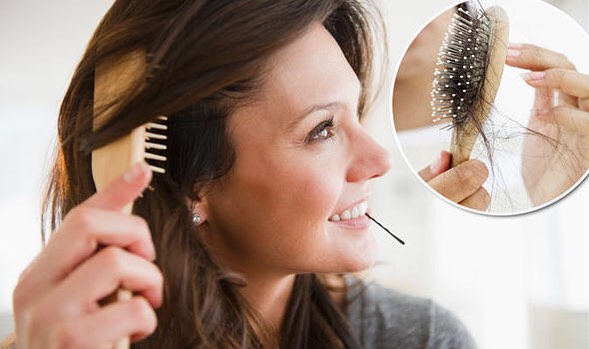Let’s face it — If you’re a woman, you’re eventually going to experience the dreaded “menopause.” Hot flashes, mood swings, insomnia, weight gain. And, if that isn’t enough, millions of women experience hair loss during menopause. Most doctors declare menopause as an “estrogen-deficient” time, where a woman’s estrogen level drops by 90%, so there may be even more hair loss after you’ve completed menopause.
Recommended Video
Does Menopause Cause Hair Loss?
The hair follicle, a complex mini-organ with its own blood supply, requires a great deal of metabolic energy to reproduce itself, and it’s one of the most sensitive among all of the organs. That means it is easily affected by even subtle shifts in energy, which can lead to hair loss.
The long-standing belief is that the hormonal imbalances that occur during menopause — when the body produces less estrogen and progesterone — trigger the production of androgens (male hormones), leading to hair loss. This is caused by an increased sensitivity to testosterone, the androgen, which turns into or DHT (dihydrotestosterone). Over time, the DHT causes the hair to miniaturize, until the hair is barely visible. This is known as post-menopausal hair loss.
 Instagram / @ocw_mg_
Instagram / @ocw_mg_
Before a woman has her last period, she may be “estrogen dominant,” meaning she has too much estrogen relative to her body’s progesterone production. This happens when the estrogen begins to overstimulate the body and the brain. “Estrogen dominance” may occur for 10-15 years, beginning as early as the age of 35, until menopause officially begins. All of these symptoms are exacerbated by stress of many kinds.
Advertisement
Progesterone Therapy for Hair Loss
Plenty of medical professionals use progesterone therapy for hair loss in menopausal women as a “go-to” treatment. Since progesterone is a precursor to testosterone, it can help inhibit DHT (that tricky little devil that causes the follicles to shrink) and stop more loss from occurring. Of course, progesterone isn’t the only cause of the loss, and there are other things that might be triggering the loss. We will look at those next.
RELATED BEST 10 ON AMAZON:
| IMAGE | TITLE | TRENDS | SEE MORE |
|---|
 | Propidren by HairGenics - DHT Blocker with Saw Palmetto To Prevent Hair Loss and Stimulate Hair Follicles to Stop Hair Los... | 31407.2 | MORE VIEW |
|---|
 | Nutrafol Men Hair Growth Supplement, Clinically Effective for Visibly Thicker Hair and Scalp Coverage (1-Month Supply [Bot... | 11667.6 | MORE VIEW |
|---|
 | Fullest Hair Growth Kit: Nutrafol Women Clinically Proven Hair Supplement and Growth Activator Hair Serum with Patent-Pend... | 10 | MORE VIEW |
|---|
 | Sponsored Ad - Nutrafol Clinically Effective Strand Defender Conditioner to Strengthen and Defend Hair From Damage | 93.6 | MORE VIEW |
|---|
 | BosleyMD Minoxidil Dropper, Extra Strength Thinning Treatment/Serum for Hair Loss and Hair Regrowth for Men and Women, Top... | 5124 | MORE VIEW |
|---|
 | PURA D'OR Professional Grade Anti-Thinning Biotin Shampoo & Conditioner Set For Thinning Hair, Clinically Proven Hair Care... | 9024.4 | MORE VIEW |
|---|
 | Hair Regrowth and Anti Hair Loss Shampoo 16 fl oz, with DHT blockers- Daily Hydrating, Detoxifying, Volumizing Shampoo For... | 5665.8 | MORE VIEW |
|---|
 | Sponsored Ad - Amberen: Safe Multi-Symptom Menopause Relief. Clinically Shown to Relieve 12 Menopause Symptoms: Hot Flashe... | 90515 | MORE VIEW |
|---|
 | Biotin Hair Shampoo for Thinning Hair - Volumizing Biotin Shampoo for Men and Womens Dry Damaged Hair - Sulfate Free Shamp... | 158958 | MORE VIEW |
|---|
 | Sponsored Ad - Amberen: Safe Multi-Symptom Menopause Relief. Clinically Shown to Relieve 12 Menopause Symptoms: Hot Flashe... | 90515 | MORE VIEW |
|---|
 | Volumizing Biotin Shampoo and Conditioner Set - Sulfate Free Shampoo and Conditioner for Dry Damaged Hair Care - Thinning ... | 74067.5 | MORE VIEW |
|---|
 | Women's Rogaine 5% Minoxidil Foam for Hair Thinning and Loss, Topical Treatment for Women's Hair Regrowth, 4-Month Supply | 62084.4 | MORE VIEW |
|---|
 | Viviscal Hair Growth Supplements for Women to Grow Thicker, Fuller Hair, Clinically Proven with Proprietary Collagen Compl... | 59963.5 | MORE VIEW |
|---|
 | Nutrafol Women Hair Growth Supplement for Thicker, Stronger Hair (4 Capsules Per Day - 1 Month Supply) | 51991.3 | MORE VIEW |
|---|
 | Propidren by HairGenics - DHT Blocker with Saw Palmetto To Prevent Hair Loss and Stimulate Hair Follicles to Stop Hair Los... | 31407.2 | MORE VIEW |
|---|
 | Keranique Hair Regrowth Treatment Extended Nozzle Sprayer - 2% Minoxidil, 30 Day Supply - Regrow Thicker-Looking Hair, Hel... | 26576.2 | MORE VIEW |
|---|
 | Alopecia Amazing Hair Growth | 25448 | MORE VIEW |
|---|
 | Viviscal Women's Hair Growth Supplements with Proprietary Collagen Complex, 1 Selling for Clinically Proven Results of Thi... | 23786.4 | MORE VIEW |
|---|
Tips: "Amazon, Amazon Prime, the Amazon logo and Amazon Prime logo are trademarks of Amazon.com, Inc. or its affiliates". AS AN AMAZON ASSOCIATE, WE EARN AFFILIATE COMMISSIONS FROM QUALIFYING PURCHASES.
 Instagram / @ocw_mg_
Instagram / @ocw_mg_





















